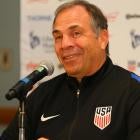
NEW YORK -- As MLS leans on the star power of Lionel Messi to begin the 2024 season on Wednesday, the sentiment outside the league's headquarters in New York offered a contrasting sentiment -- and it was not only because of the late February temperatures. Hours before kickoff, members of the Professional Soccer Referees Association (PSRA) staged simultaneous protests in midtown Manhattan and Arlington, Texas in an attempt to send a message.
"Today's the start of the season," Guido Gonzales, a referee and member of the PSRA, told CBS Sports. "Today's the day that they've got replacement referees out there, taking our jobs. We just want the people in that office to hear us."

Golazo Starting XI Newsletter
Get your Soccer Fix from Around the Globe
Your ultimate guide to the Beautiful Game as our experts take you beyond the pitch and around the globe with news that matters.
Thanks for signing up!
Keep an eye on your inbox.
Sorry!
There was an error processing your subscription.
A group who belong to the union opted to protest on Wednesday after being locked out four days earlier by the Professional Referees Organization (PRO), the employer of match officials across the U.S.' professional soccer leagues and MLS' partner in negotiations. The dual protests mark a new point of tension as the parties work towards a new collective bargaining agreement after the previous one expired on Jan. 15 and 95.8% of the PSRA's members rejected their latest offer last week. The points of contention are familiar ones in labor disputes -- salary, benefits and travel conditions are among the PSRA's priorities -- but the standoff is now a prime example of growing pains in MLS' ecosystem amid the league's rapid expansion that has been in play long before Messi's Inter Miami arrival last summer.
Since the start of the last CBA in 2019, MLS has expanded from 24 teams to 29 and between that and a new playoff format, the number of games the league has hosted rose from 408 in 2019 to 493 in 2023. The PSRA believes the demands on match officials have only increased as a result, and that the PRO's latest offer did not reflect that.
"Anyone that's been following the league has seen the great things that have been happening -- star players, new teams coming in, sponsorship deals, so it seems like everything is on an upbeat," he said. "We just feel like we're not being treated fairly when it comes to the same level in the numbers, in the compensation, in the fair treatment, working conditions for us. It's not on par with where the league is going."
The specifics of the PRO's latest offer included a 25% overall increase in salaries for match officials, with referees slated for a jump of 10-33%, assistant referees due for a 75-104% increase and video assistant referees expecting a raise of 15-100%, per ESPN. The PSRA have also demanded better travel arrangements considering the increase in teams and games and say that the PRO have offered them just four business class flights a year in the new CBA.
In the meantime, the PRO has lined up a group of replacement officials to oversee matches during the lockout. More than 60 match officials with experience around the world and in other American leagues were reportedly enlisted, but there are concerns around their preparedness for this season. They have only had a few days' notice to prepare for the games, and so the PRO and MLS decided on Wednesday not to implement new rules that the PRSA's members had been rehearsing for several months. It is a plan that has MLS' seal of approval, though.
"PRO worked for months and addressed all the issues that were raised by PSRA's bargaining unit," MLS executive vice president of sporting product and competition Nelson Rodríguez said in a statement on Saturday. "It is also unfortunate that the PSRA rejected PRO's offer for a mutual no strike -- no lockout commitment, which would have allowed all match officials to continue working during ongoing negotiations. PRO has informed us of its contingency plan for the upcoming MLS season, which includes utilizing experienced professional match referees supported by veteran VAR officials. We are confident in the comprehensive plan they have put in place."
Players are less confident. The MLS Players Association said in a statement Tuesday that it was concerned the lack of preparedness on the replacement officials' part "will not only negatively impact the quality and results of our matches, it may also jeopardize the health and safety of our players," and also argued that this strategy is "a step backward for MLS."
Gonzales concurred, at first saying he "had no words" for the backup officials. "It's a little emotional for me but we're not happy," he added. "They're making our situation a little bit tougher and they're keeping me without a job for a longer period of time."
And so members of the PSRA took to the streets with symbols of protest that have become iconic to picketers advocating on behalf of laborers, as well as those unique to referees. Yellow and red signs bearing phrases including "fair pay is fair play" and "Major League Soccer referees locked out" did the work of attracting the attention of passersby in New York, some of whom stopped to ask questions and others who quickly voiced their support -- or honked their car horns in solidarity -- during their travels. Even more stopped by to capture pictures and video of an inflatable pig, which was playing the role of the inflatable rat that usually signals a pro-union protest and served as the backdrop as others joined the picket line, including a local branch of the International Brotherhood of Teamsters.
the inflatable pig has officially checked into the PSRA protest outside MLS headquarters pic.twitter.com/stGiN7dhmt
— Pardeep Cattry (@pcattry) February 21, 2024
The PSRA's issues go further back than MLS' recent expansion, though. Match officials on the picket line, many of whom were supported by family members, said being a professional referee in the U.S. has rarely paid well. Some officials were paid as little as a few hundred dollars per match in earlier seasons, and the PSRA insists that low wages continue to be a problem that are in stark contrast to the money the league and its teams are collecting at times. Gonzales estimates that around 50% of the PSRA's membership work second jobs to make ends meet, but that those on the road are not physically able to.
In a recent social media post, the union pointed at Inter Miami's recent preseason friendly at FC Dallas, when assigned match officials were paid less than $400 for a match that had a crowd of 32,000. Gonzales said he saw someone describe the situation as such: "100% of a low number is still a pretty low number."
Maybe there’s a reason the members rejected the MLS/PRO offer of "25% overall increase."#FairPayisFairPlay pic.twitter.com/uvNOVSGcoj
— PSRA Officials (@PSRAofficials) February 18, 2024
Travel arrangements are also a point of contention since several match officials spent a large chunk of time away from home. Some referees spend as many as 300 days on the road and can be gone for two weeks at a time depending on the match schedule and the regularly scheduled group sessions arranged by the PRO to ensure everyone is fit and up to date on the latest standards.
"Somebody like me spent almost 200 days of last year away from home, jumping from hotel to hotel, city to city, airplane to airplane and I want to travel comfortably so I am mentally prepared, physically prepared to do the job that is required of me -- training, refereeing, running, whatever the case may be," Gonzales said. "You have players flying charter and they're out there. We're doing the same thing when it comes to 90 minutes. Just be fair."
The PSRA plans to stage another series of protests in front of MLS' offices -- the same building where the PRO is also headquartered -- on Saturday and Sunday, when most of the teams in the league play their first game. With neither side appearing close to budging, it is unclear when the parties will reach a resolution. Considering the notoriety -- fair or not -- that follows referees in every sport, the big question for MLS as the season gets underway is if the labor dispute has the possibility to upstage a product that the league is pushing hard in the era of Messi.
















